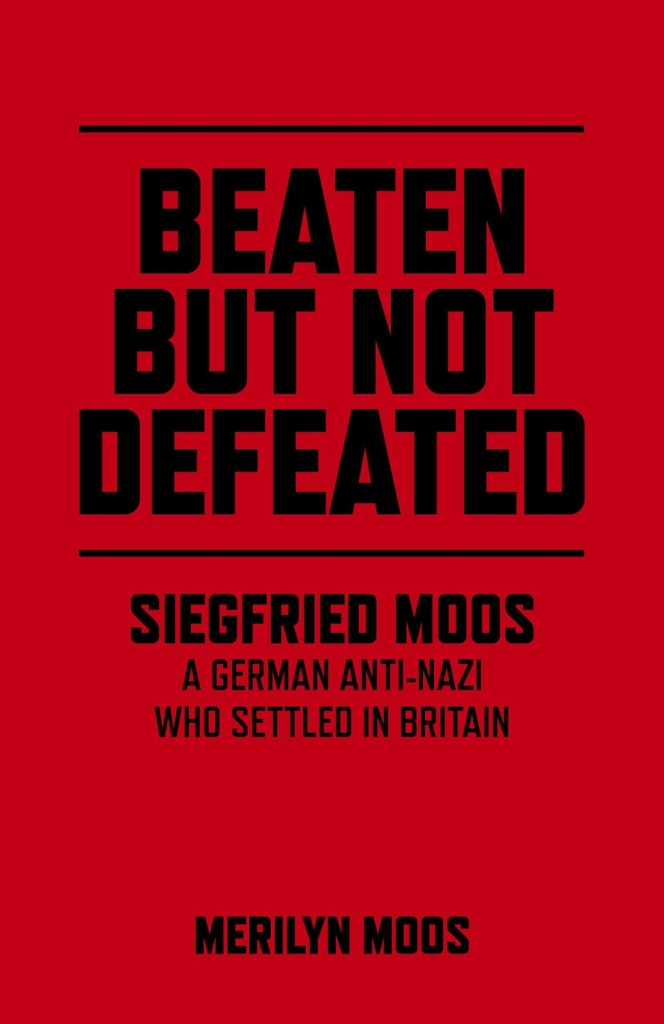Book review: Beaten But Not Deafeated
Book Review of Beaten but not Defeated: Siegfried Moos – A German Anti-Nazi who Settled in Britain by Merilyn Moos. Chronos Books, Winchester 2014. £17.99
by Louis Bayman
You might be forgiven for asking, who was Siegfried Moos? There is little reason for fame to accrue to an academic at the Oxford Institute of Statistics who advised Harold Wilson’s 1966-70 Labour government. But the fact that his daughter, Merilyn Moos, asks the same question should signal that his political biography, and his encounter with the great historical events of the European 20th century, contains considerable mystery. While many an adult may wonder what stories their parents never told them in childhood, there are few who have quite as much to speculate on as Merilyn.
 Siegfried – ‘Siegi’ to his friends, and throughout this book – was born in Munich in 1904, in a Germany that was the original newly industrialising country. Its surging growth and imperial ambition reached its height while it had only been a nation for little more than one generation. Siegi was born into a Europe of crowned heads and old empires a year after the death of Queen Victoria, where the terms ‘Soviet’, ‘Fascist’, ‘World War’ and ‘Nazi’ were yet to have any political meaning.
Siegfried – ‘Siegi’ to his friends, and throughout this book – was born in Munich in 1904, in a Germany that was the original newly industrialising country. Its surging growth and imperial ambition reached its height while it had only been a nation for little more than one generation. Siegi was born into a Europe of crowned heads and old empires a year after the death of Queen Victoria, where the terms ‘Soviet’, ‘Fascist’, ‘World War’ and ‘Nazi’ were yet to have any political meaning.
Siegi’s political formation occurred in the decade and a half from 1918-33, years of near-unimaginable and continual political convulsion as Germany’s devastating defeat in the Great War and consequent collapse were met with revolution, the toppling of the Kaiser, workers’ insurrections, the breakdown of the financial system, and fatal street fighting. Hitler’s dictatorship was the final outcome, exalting social conformity and genocidal anti-Semitism, at the cost of the physical destruction of the German left. Siegi, a Communist, an artist, and a Jew, fled.
Reading this book one can understand why the 1930s have been referred to as midnight in the century for progressive hopes for change in Europe. Siegi’s existence in this twilight of ideals is rich in drama. Moos reconstructs her father’s exile, hurriedly embarked upon in clandestine conditions on foot across hundreds of miles, in a country where his political and religious persecution was government policy.
She delves into her parents’ marital problems, subject as they were to utter isolation and the consequences of bitter disillusion. Merilyn considers her mother’s romantic involvement with an Irishman who transpired to spy for the Soviets, while Siegi’s fall-out with the Communist party threatened to jeopardise support networks that were crucial to a political exile.
The quiet life
As the book continues towards its final chapters detailing Moos’s time in Oxford, Durham and North London, we glimpse underlying conflicts with his daughter Merilyn. A man who had participated in the most militant challenges to social convention was now determined to lead the quiet life of a respectable professional. Clearly wishing a life free from disturbance, he remained silent about his experiences, took no further part in activism, nor allowed his daughter the space to challenge her restrictions.
Drama is also at the centre of this story in another way. The maelstrom of 1920s Germany saw all aspects of life turned inside out; nowhere more so than in the arts, as transformations occurred in all arenas of creative endeavour from architecture to advertising, cinema to social critique, cabaret to constructivism, and, in Siegi’s case, a radical, workers’ theatre. Vanguards organised for insurrection in the factories, and avant-gardes sought to be worthy of the same tasks. One of the most valuable aspects of this book is to be found in the appendices, in which Ian Birchall translates Moos’s articles on the ‘role of revolutionary theatre’. In dialogue with those like Brecht, Moos insists in 1930 that ‘our troupes must be troupes of struggle, our words must be arrows and the laughter of our audience must be bitter as gall.’ (As alternative circuits go it bears little comparison with Ben Elton.)
The epic tragedy of the era was the failure of the German left, not only to achieve socialism but to defend itself against its own slaughter. Stalin brokered a deal with Hitler between 1939-41, giving the Nazi war machine the time to occupy most of Europe in what was the last of a series of decisions by the left which had paved the way for the Nazis’ ascendancy. On the victory of Hitler’s coalition in January 1933, the Communist Party’s official line was that the Social Democrats, Germany’s largest leftwing party, were in fact the more dangerous ‘fascists’.
An internationalist love story
Siegi belonged to those Communist oppositionists who saw that outright opposition to the Nazis was their only hope, led variously by Brandler and the more comprehensively critical Trotsky (Siegi being closer to the former’s group, his daughter Merilyn the latter). Merilyn traces her father’s probable course through the ill-fated attempts to muster a workers’ anti-Nazism in the period when it might have succeeded. The result for Siegi was exile, not only from Germany, but from his political home, the now Stalinised Communist left. The results for Europe were war and the destruction of European Jewry, not to mention the uprooting of workers’ revolutionism as a factor in daily political life.
As an interweaving of family history with Germany’s decisive role in 20th century life, Beaten but not Defeated has something in common with this year’s Red Love: The Story of an East German Family by Leo Maxim. Maxim tells of a family who after the war remained in divided post-war Germany, and seems to subscribe to the view that after the horrors of the last century, ideals are things that belong to the past. Moos’s story is told to remind us that to be beaten, as the title states, does not mean to be defeated. Merilyn’s final reconciliation with her father ends as, in his hospital bed, she sings him the workers’ anthem the Internationale.
While no government poster ever asked what daddy did in the inter-war years, this fascinating account attest to an internationalist story, and that it was actually then that our modern world was forged. As for the geopolitical shocks that bring today’s immigrants to North London, the future has yet to tell their stories.
Details of the booklaunch of Beaten But Not Defeated on the 14th November can be found here.


Join the discussion